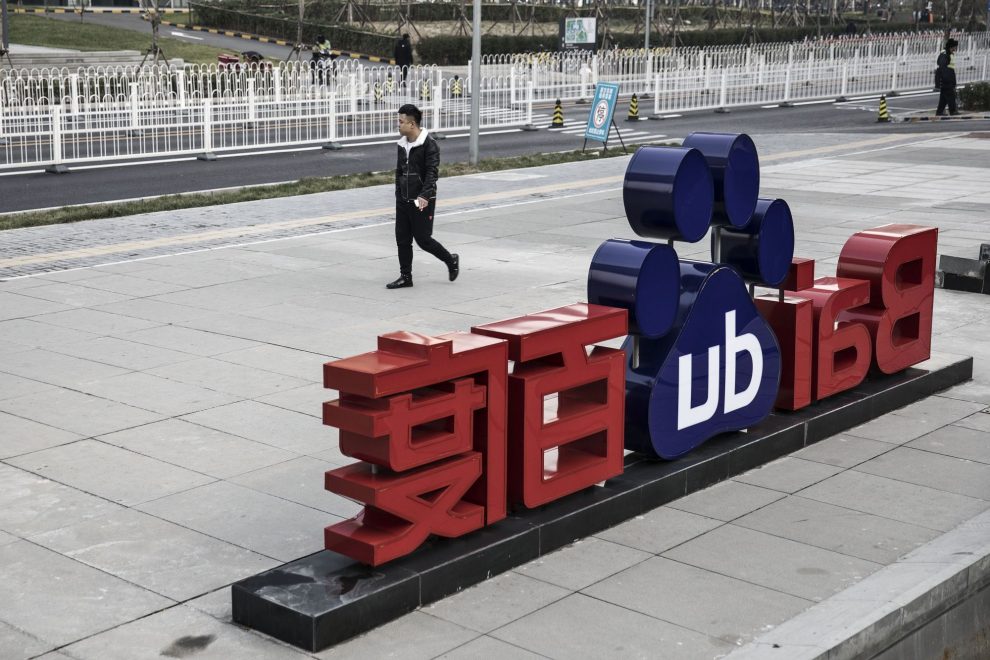
(Bloomberg) — So challenging are the times for Baidu Inc. that even meager revenue growth is cause for celebration.
The Chinese search leader’s shares surged as much as 10% in extended trading after it reported sales inched up 1.4% to 26.3 billion yuan ($3.8 billion) in the June quarter, versus projections for a drop. Baidu foresees current-quarter revenue of 26.9 billion yuan to 28.5 billion yuan, flat to down a tad and roughly in line with estimates.
The better-than-expected results will soothe investors’ worries for now that the 19-year-old company is losing steam rapidly as China’s internet evolves from desktop to mobile. Yet it continues to grapple with a broader economic slowdown as well as competition for advertisers from Tencent Holdings Ltd. and ByteDance Inc. The latter is chipping away at Baidu’s ad sales via increasingly popular news and social media apps, and also recently launched a general search engine — a direct challenge to Baidu’s core business.
“Facing severe outside challenges and a weak macro environment, the company has initiated a series of groundbreaking changes from top to bottom, involving company structures, personnel moves and business consolidation,” Baidu Chief Executive Officer Robin Li said in a letter to employees after the results. “Despite periodic pain, these changes will have positive and profound impact, enabling Baidu to walk farther and steadier.”
Read more: Baidu’s $66 Billion Dive Knocks It Out of China’s Internet Top 5
Net income dropped to 2.41 billion yuan, reversing a loss in the prior quarter — Baidu’s first since going public in 2005. The company enjoyed a near-monopoly in online search after Alphabet Inc.’s Google exited China in 2010 but has in past years suffered a plethora of troubles from a regulatory clampdown over healthcare ads to the departure of a slew of top executives including Xiang Hailong, a 14-year veteran who ran its core search business.
The search giant is betting on new technology such as artificial intelligence and self-driving cars, but these pushes aren’t going to pay off financially any time soon. In the meantime, Baidu is investing in content to hold onto users, backing social media platforms including Q&A site Zhihu and science sharing platform Guokr. Daily active app users climbed 27% in the June quarter to 188 million, while subscribers on its Netflix-style iQiyi service grew by about 50% to 100.5 million in June.
Baidu had fallen off the list of China’s five most valuable internet companies, trailing Meituan and NetEase Inc., after shedding more than 40% of its market value this year. Once touted as a member of China’s tech triumvirate alongside Alibaba Group Holding Ltd. and Tencent, Baidu has been left behind as the country’s internet evolves.
Baidu’s forecast “indicates continued pressure from multiple headwinds, including China’s weakening macroeconomic environment hurting advertisers’ sentiment, the company’s cleanup of low quality health-care advertisers, and the large influx of competitive advertising inventory depressing industry prices,” Bloomberg Intelligence analyst Vey-Sern Ling said.
To contact the reporter on this story: Zheping Huang in Hong Kong at [email protected]
To contact the editors responsible for this story: Edwin Chan at [email protected], Colum Murphy, Peter Elstrom
<p class="canvas-atom canvas-text Mb(1.0em) Mb(0)–sm Mt(0.8em)–sm" type="text" content="For more articles like this, please visit us at bloomberg.com” data-reactid=”27″>For more articles like this, please visit us at bloomberg.com
©2019 Bloomberg L.P.












